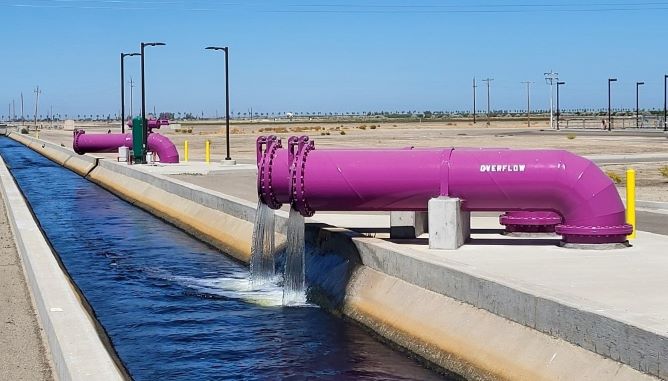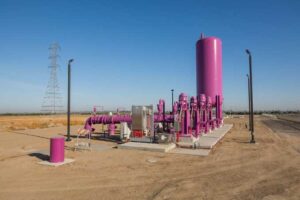Recycled Water

The California Water Code defines recycled water as “water which, as a result of treatment of waste, is suitable for a direct beneficial use or a controlled use that would not otherwise occur and is therefore considered a valuable resource.” (California Water Code § 13050(n))
Water recycling is the reuse of treated wastewater for beneficial purposes such as agricultural and landscape irrigation, industrial processes, toilet flushing, and replenishing a groundwater basin. A common type of recycled water is water that has been reclaimed from municipal wastewater. Using recycled water reduces the need to use drinking water for non-potable uses.
The State Water Resources Control Board Division of Drinking Water (DDW) establishes the standards for municipal wastewater reuse (recycled water). The “Water Recycling Criteria” section of Title 22 of the California Code of Regulations (Division 4, Chapter 3) defines the terms and regulations related to recycled water, including specific treatment and use requirements for various types of recycled water. The City of Fresno must at all times meet these requirements for recycled water treatment and use.
The California Regional Water Quality Control Board (Regional Board) is responsible for the permitting and ongoing regulation of recycled water treatment. The City of Fresno submits regular reports to the Regional Board as required and is in full compliance with all regulations.
NOTE: These documents can be made available in alternate formats upon request. To request alternate formats, contact the Wastewater Management Division at (559) 621-5100.
Recycled Water Safety
The practice of recycling water is far past the experimental stage in this country – in fact, it is a well-established practice worldwide. Recycled water is being used around the world for crop irrigation, as well as the irrigation of parks, school grounds, golf courses, and other open spaces. Recycled water is used also in business parks, for indoor fire protection, for toilet flushing in commercial buildings, in decorative fountains, and at car washes.
Recycling water is not a new practice, and the City utilizes advanced treatment processes (tertiary treatment) to ensure that all regulatory requirements are met and that the recycled water it produces is of the highest quality possible.
Pursuant to state law, recycled water is distributed in a separate recycled water delivery system, and the City of Fresno has constructed recycled water mains to deliver recycled water to certain areas of our community for specific purposes.
The 2009 edition of the Uniform Plumbing Code (UPC) changed the code to require purple pipe for the distribution and delivery of recycled water in order to protect the potable water supply. Implementing the use of purple pipe is intended to prevent cross connection between water and recycled water. The City’s recycled water distribution system utilizes purple pipe, as required.
Recycled Water and Children:
DDW has determined that tertiary treated water (recycled water) complying with California Title 22 standards is safe. Park areas across the state have been irrigated with recycled water safely, with no reported cases of illnesses.
Just as children may swallow some water at a beach or in a swimming pool, they may also swallow some recycled water without repercussions. Adverse health effects from recycled water could appear only if it were ingested in large quantities over an extended period of time, which is why it is not intended for drinking. There have been no reported cases of people getting sick from recycled water, though.
Use of Recycled Water
It is a state requirement that locations using recycled water place signs around the area advising the public that recycled water is being used, and advising the public to refrain from drinking the water. Signs must be clearly marked with bilingual text that announces the use of recycled water in the area. In addition, pipes, sprinkler heads, or pumps distributing recycled water are required to be marked or color coded purple.
Recycled water can play a major role in the successful management of turf grasses in our area. Since recycled water is produced from municipal wastewater, the large volumes of water needed to maintain adequate turf growth are readily available, even during periods of water shortage. The higher nutrient content of nitrogen, phosphorous and potassium in recycled water is beneficial to turf grasses. In many cases, turf and other landscape plants will be able to obtain from recycled water all the phosphorous and potassium they require, and a large part of their nitrogen requirement. Sufficient micronutrients are also supplied by recycled water.
Benefits of Recycled Water

Recycled water is a component of Fresno’s Urban Water Management Plan, the long-range plan to develop a more sustainable water supply for our community. The use of recycled water for non-potable applications allows the City to effectively supply water for parks, schools, car washes, golf courses, and other landscape irrigation uses, while reserving potable drinking water for uses like cooking, showering, laundry, and of course, drinking.